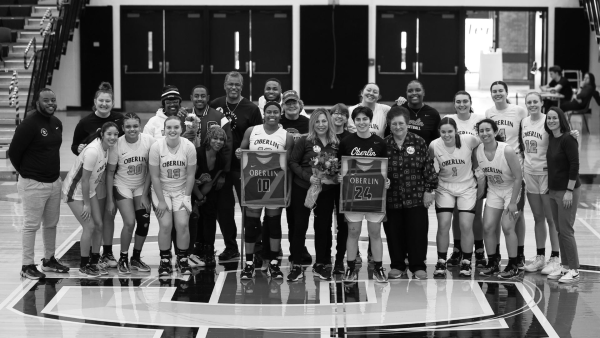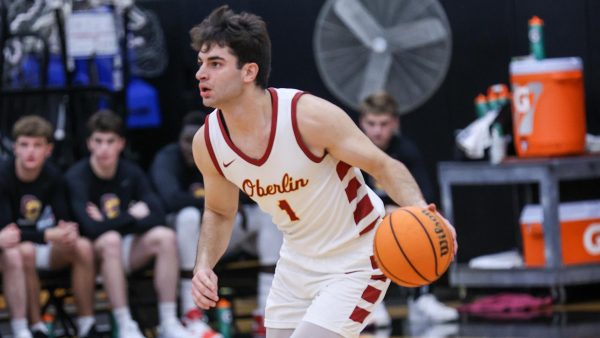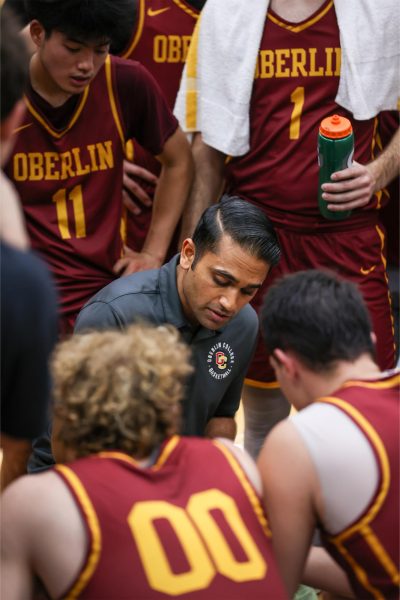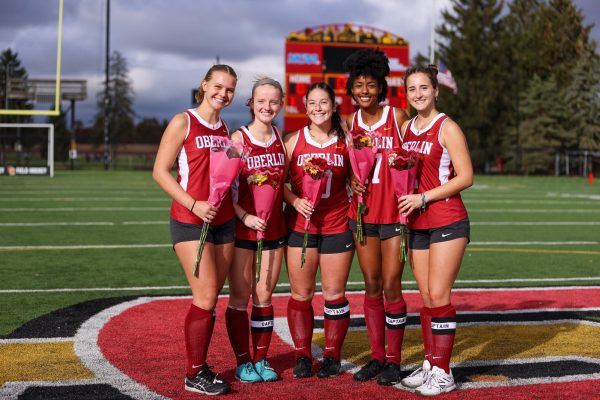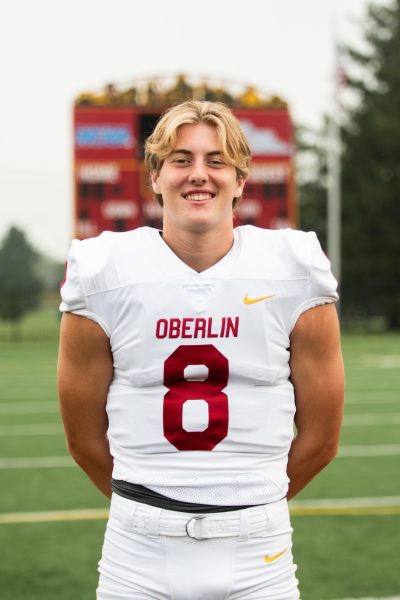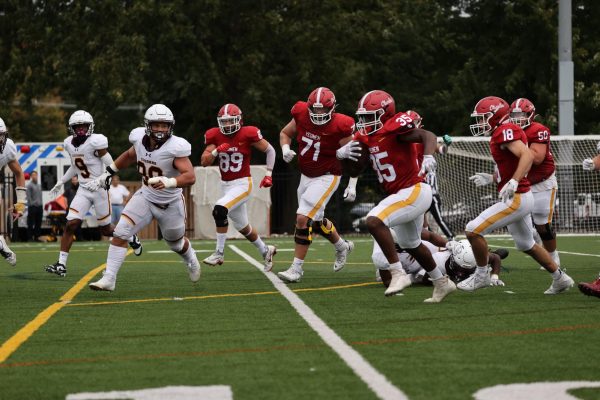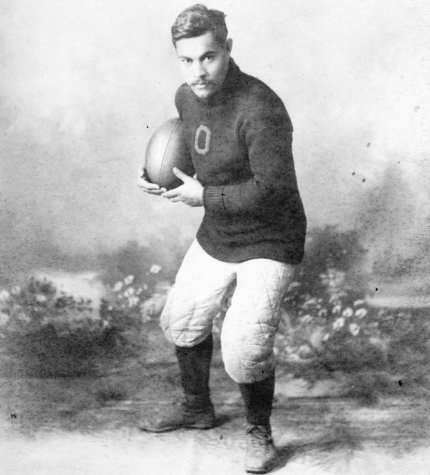Non-Liberal Obies Reflect on Oberlin’s Political Status Quo
Oberlin is known — and often ridiculed — for having radically progressive students, but not everyone at Oberlin is so politically left-leaning. The recruiting process in athletics has been known to bring in students who might not have otherwise chosen Oberlin. In fact, student-athletes at Oberlin hold a variety of beliefs ranging from far-left to conservative.
First-year football player Matt Cohn considers himself a moderate conservative. He was aware of the school’s political culture when he committed to play at Oberlin, but that did not deter him from applying. Instead, he was more focused on the academic and athletic opportunities the College had to offer.
“I was aware of the strong passion Oberlin’s student body had for social justice and activism,” Cohn wrote in an email to the Review. “I did take this into consideration, as I didn’t envision myself constantly getting involved with the movements and clubs that support such left-leaning culture at Oberlin. However, I came to the conclusion that — regardless of political views and opinions — each student shares the common goal of earning a degree that will serve as [their] foundation to their transition into the real world; that was enough of a selling point for me to enroll alongside the opportunity to play football.”
Similarly, second-year on the women’s soccer team Yana Fielkow, who identifies as a conservative, chose Oberlin for its academic reputation, but she did not know about Oberlin’s political reputation until she visited the College for the first time. Fielkow was recruited by Dan Palmer, head coach of the women’s soccer team, and her parents were encouraging her to play soccer in college. While she was not committed to Oberlin after her visit, she and her parents ultimately decided that the school offered her the best opportunities for her future.
“During my visit, I became aware of just how liberal this school is, and that honestly was part of the reason I was not really interested in coming here at first. But then the pros and cons list my parents and I made together made me realize that committing here would be better for my future,” Fielkow wrote in an email to the Review.
However, some student-athletes, like women’s basketball player Ally Driscoll, OC ’20, who identifies as a liberal with liberatarian views, were attracted to Oberlin because of its rich political atmosphere. However, she did not realize how much of a role politics play in Oberlin culture.
“I did know about the political climate of Oberlin coming in, and it was something that very much attracted me,” Driscoll wrote in an email to the Review. “I mostly agree with many of Oberlin’s environmental and social activist platforms and was excited to be in a climate where people seemed, for lack of a better term, ‘sensible.’ However, in retrospect, I don’t think I knew the breadth to which politics would play a factor in campus social life.”
The experiences that right-leaning students have faced both socially and athletically are varied. Some players say that their political stance has not had an impact on their life at Oberlin, others state the opposite.
Fielkow believes that she has experienced pushback from others when sharing her political opinions, both academically and athletically. She cited in-person and online instances where she felt ostracized from the College community for her political beliefs, but she also expressed little regard overall for the pushback that she has received.
“I do not talk about my political opinions with my teammates, though, because I know very well that none of them would have any respect for me if they knew,” Fielkow wrote. “I don’t feel comfortable sharing my political beliefs with my classmates or my teammates. I got called out on Yik Yak for having a sticker on my computer that says ‘Facts Do Not Care About Your Feelings,’ and a couple of people responded saying something like ‘Why do conservatives come here?’ … Another person called me an idiot. Another time, I was talking to someone … at a party, and when she found out that I was a conservative, she stopped talking to me.”
Cohn believes that the status quo at Oberlin is politically left-leaning. Nevertheless, he feels comfortable sharing his beliefs with friends and teammates.
“Oberlin supports a diversity of political opinions, but it is very mild and not often spoken about; said political diversity is never really discussed,” he wrote. “Additionally, it has been made clear that the ‘politically left-leaning culture’ is the status quo.”
Cohn added that he is comfortable sharing his political opinions in non-athletic environments.
“My take on the subject is that politics aren’t really appropriate for the field, weight room, or film room,” he wrote. “I think my coaches would agree; there’s a time and place for everything. When I am not in these environments, I feel comfortable sharing my beliefs solely because I stand with my views and am not afraid to discuss them. However, I have tried to limit such expressions to ensure I share my opinions at appropriate times.”
Typically, there is greater diversity in the political beliefs found in the Athletics department than on the larger College campus. For Driscoll, it was often within the athletic community that she was able to have respectful productive political conversations.
“Being a part of the athletic community, you find a much wider range of political beliefs than in the general student population,” she wrote. “I felt that political opinions should not have to be so polarizing within our community. There seemed to be more athletes who identified with this belief … Those who agreed with this way of thinking, I was able to have uncensored conversations with. We were able to constructively disagree, come to understand one another without judging, and still have a healthy friendship. All in all, I was comfortable sharing my beliefs as long as I felt I was in a truly ‘inclusive’ environment, after all, that was the largest reason I chose Oberlin.”
While Driscoll never faced backlash from the athletic community or her social sphere, she stated that her divergent political beliefs led to contentious moments in her classes. She believes this can be attributed to the personal nature of politics at Oberlin. She also noted that outside of Oberlin, her views are often seen as liberal, but at Oberlin, they were considered more moderate.
“I embraced the counterculture that thrived in Oberlin, but I never thought disagreeing with the Oberlin status quo should justify excluding people from conversations or discrediting them as a person altogether,” she wrote. “In a larger context, I’d be considered a very left-leaning person, but at Oberlin, I’m seen as more akin to a libertarian. I felt comfortable talking to my friends/teammates about my liberal views, but hesitant to share my more moderate views on certain topics. From my academic classes those types of conversations never went over well. For Oberlin, it comes with the territory. The school’s history is rich with political activism, and many students come to Oberlin because of this reputation. For many, political activism is personal. Therefore, I found it difficult to have political conversations of differing opinions without affecting the dynamic of your relationship.”
Fielkow, who has lost friendships due to her viewpoints, wishes that people could respect others who do not share the same political beliefs.
“I wish the people at Oberlin understood that differing political opinions didn’t have to make or break a friendship,” Fielkow wrote. “I also wish that people could manage to respect people who are on the right side of the political spectrum.”
Driscoll believes that Oberlin would become more inclusive and true to its motto if political debates were possible.
“Solutions are always best when ideas come from a multitude of perspectives/people,” she wrote. “When Oberlin students are put into a larger context, most are on the left. Even though everyone does not subscribe to every liberal, socialist, anarchist, etc., belief, we are all mostly on the same side. I believe Oberlin would actually embody its belief of inclusiveness if it allowed for the vocalization of opinions differing from its current status quo.”
Cohn emphasized that at the end of the day, political beliefs have no impact on his ability to be a good teammate.
“Political opinions have no effect on someone’s ability to contribute to a win,” he wrote. “I show up to practice, lifts, and games on a daily basis to play football, not talk politics. I think my whole team can agree that winning games and developing as a football player is far more important than associating with red or blue.”


